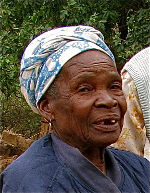
While a joint Malawi-American group started planning for the international school, the Malawi Project obtained information about the medical need that sparked the Chief’s request. It was learned that literally thousands of villagers in the Lintipi area have to travel 15 miles or more to reach the district hospital in Dedza. With no mechanized vehicles to transport ill patients it is necessary to walk, ride the back of a bicycle, or bounce along pothole laced, dirt roads in a wooden cart drawn by a pair of oxen. Few people from developed nations can imagine the harrowing trip, bouncing along on the back of a bicycle, or thrown around on hard slats in the wooden bed of an ox-cart. It is a long, dangerous, and harrowing trip, as the patient and the caretaker make their way slowly down steep, winding, mountain roads. Then, as if this were not enough, realize that when they reach the hospital there is the very real possibility the cash strapped government facility will be out of supplies, and unable to give the proper assistance. There is always the risk they will be returning home without care. No wonder, the chief extended her first and only request for someone to hear her plea for healthcare for her people.
Two Groups Respond with Assistance
Not only did members of the Malawi Project hear her request, so did the Board of Directors of the Dzidalire Development Agency. This later agency was formed in 2008-09 to assist the people in this exceptionally poor region of Malawi to develop the needed skills to become self-reliance. The Malawi Project assisted with funds to obtain land, and also helped in the creation of the marketing literature for the organization. (See upcoming story about Dzidalire in the next few days).
The two groups have set out to fulfill the request of the Chief, and build a medical clinic and birthing center that will be adequate to supply the needs of the people in the neighboring villages. The facility will contain twenty-eight rooms, with a construction cost estimate of $300,000.00. The Malawi Project has already been successful in sourcing most of the needed equipment, and the supplies to make the facility a first-rate asset to the surrounding communities. At the same time sufficient funding is available to pour the foundation for the buildings, and begin construction.
Village People Making Bricks
Meanwhile, the village people who live around the needed facility have been hard at work making bricks for construction of the buildings. While the bricks are a major expense to the project, the cost of concrete for the floors, the windows, doors, and metal roof will compose the major outlay for the buildings.
Both Sides Working Hand in Hand
At the conclusion of the project the facility will be solely owned and operated by Malawians. This is in line with the long-standing position of the Malawi Project to not own, manage, or control what should belong to the people of another country. This, as with its other programs, is built on joint respect, joint relationship, and the confidence that if the Malawi people own and manage their own programs, the pride of ownership and the self confidence that comes with personal achievement will sustain the programs long after the western supporters have ended their support. According to Scott Gordon, President of the Malawi Project, “The part the Malawi Project plays is to bring needed resources to the table for a project. The people of Malawi bring their creativeness, commitment, skills, and long-term sustainability to the program. Combine what both of us offer the other, and one can see a successful and dynamic relationship that can only lead to success. We feel the time has come for contributors to follow a different approach to helping Africa, and the Malawi Project intends to be in the forefront of this movement. Our relationship with the Dzidalire Agency extends to the time of it’s creation, and we have the greatest respect for those who brought this non-governmental organization (NGO) into existence.”
Members of the Malawi Project Board of Directors are currently taking the story to possible contributors in order to reach the funding goals and the completion of this joint program. It is hoped the buildings can be under roof by the time the rainy season begins in October 2011.
